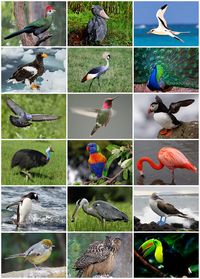
Photo from wikipedia
Social monogamy with bi-parental care is the most common breeding pattern in birds, yet cooperation between mates has not been intensively studied to date. In this study we investigate synchronisation… Click to show full abstract
Social monogamy with bi-parental care is the most common breeding pattern in birds, yet cooperation between mates has not been intensively studied to date. In this study we investigate synchronisation of parental behaviours in the blackcap Sylvia atricapilla, a species characterized by bi-parental care and high nest predation. We test the hypothesis that mates synchronize their behaviours to decrease total activity at the nest, which is known to affect predation rate in birds. We examine if blackcap parents synchronise their feeding trips more when nestlings are at the poikilothermic stage, and they may be more vulnerable to nest predation due to their inability to escape and survive outside the nest without parental brooding. We also investigate the alternation of feeding trips by parents. We show that blackcap parents synchronise the majority of their feeding trips during the whole nestling period, and the level of parental synchrony is higher before nestlings develop endothermy. The alternation of male and female feeding trips was much higher than would be expected by chance and was positively related to parental synchrony. We have demonstrated that synchronisation of parental feeding trips significantly decreased parental activity at the nest, and nest survival time increased with the synchrony of parental feeding trips.
Journal Title: Scientific Reports
Year Published: 2018
Link to full text (if available)
Share on Social Media: Sign Up to like & get
recommendations!